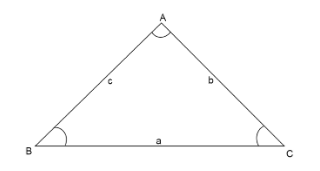Question
Question: In a \[\vartriangle ABC\], the values of a, c, A are given and \[{b_1},{b_2}\] are two values of the...
In a △ABC, the values of a, c, A are given and b1,b2 are two values of the third side b such that b2=2b1. Then sinA= ?
A.8a29a2−c2
B. 8c29a2−c2
C. 8a29a2+c2
D. None of these
Solution
We use the law of cosines to calculate the cosine of angle A. Form a quadratic equation with variable ‘b’. Since b1,b2 are two values of the third side b means that b1,b2 are two roots of quadratic equation. Use the relation of roots with the coefficients of the equation to find the value of sine of angle A.
- In triangle ABC, if side a has opposite angle A, side b has opposite angle B and side c has opposite angle C then cosA=2bcb2+c2−a2
- If a quadratic equation ax2+bx+c=0 has roots α,β then we have relation between coefficients of equation and roots of equation as: α+β=a−b and αβ=ac
Complete step by step solution:
We have a triangle ABC, sides opposite to angle A, B and C are a, b and c respectively.

Use law of cosines
⇒cosA=2bcb2+c2−a2
Cross multiply the values
⇒2bccosA=b2+c2−a2
Shift all values to one side of the equation
⇒b2−2bccosA+c2−a2=0
This forms a quadratic equation in ‘b’
⇒b2−(2ccosA)b+(c2−a2)=0...............… (1)
Since it is given b1,b2are two values of the third side b
Then b1,b2are the roots of the equation (1)
Then we know b1+b2=1−(−2ccosA)andb1b2=1c2−a2
I.e. b1+b2=2ccosAandb1b2=c2−a2....................… (2)
Also, b2=2b1
Substitute the value of b2=2b1in b1+b2=2ccosA
⇒b1+2b1=2ccosA
⇒3b1=2ccosA
Divide both sides by 3
⇒b1=32ccosA.................… (3)
Substitute the value of b2=2b1in b1b2=c2−a2
⇒b1×2b1=c2−a2
⇒2b12=c2−a2
Divide both sides by 2
⇒b12=2c2−a2.............… (4)
Square equation (3) and equate it to equation (4)
⇒(32ccosA)2=2c2−a2
Cross multiply the values
⇒92×4c2cos2A=c2−a2
⇒98c2cos2A=c2−a2
Cross multiply the values
⇒8c2cos2A=9c2−9a2
Divide both sides by 8c2
⇒cos2A=8c29c2−9a2
Since we know cos2x=1−sin2x
⇒1−sin2A=8c29c2−9a2
Shift all constant values to one side of the equation
⇒1−8c29c2−9a2=sin2A
Take LCM in LHS
⇒8c28c2−9c2+9a2=sin2A
⇒8c29a2−c2=sin2A
Take Square root on both sides of the equation
⇒8c29a2−c2=sin2A
Cancel square root by square power
⇒sinA=8c29a2−c2
∴The value of sinA is 8c29a2−c2.
∴Correct option is B.
Note: Students are likely to make the mistake of assuming the variable in the quadratic equation as ‘c’ which is wrong because we are given the values of a, c and A are given. The question states the values of ‘b’ are b1,b2 so the variable has to be ‘b’ in the quadratic equation then only we can find its roots.
